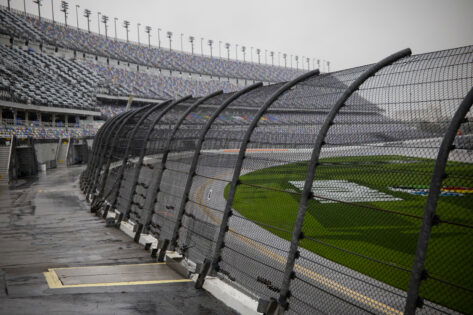“A penalty of $100,000 and a 50-point deduction”, NASCAR made its stance clear last season when Ross Chastain and Austin Dillon worked together in support of William Byron. That was just the beginning. Martinsville served as a wake-up call, prompting NASCAR to take decisive steps against race manipulation.
The rulebook was rewritten, and the Daytona 500 was proof of just how strictly teams and drivers would adhere to it. Ben Rhodes found himself in desperate need of drafting help, a move that could have dramatically improved his finish. Yet his fellow manufacturer drivers stayed away. With no assistance, Rhodes had little chance, of highlighting just how much the sport had changed under the new regulations.
In spite of a Stage 1 win, Rhodes didn’t even climb to the top 10
ADVERTISEMENT Article continues below this ad
On high-speed tracks like Daytona and Talladega, drafting has always been a fundamental strategy. Drivers across teams and manufacturers worked together. This helps one to get major aerodynamic partnerships and gain an edge over others. But under NASCAR’s new guidelines, such cooperation now carries significant risks. Not only drivers, but even manufacturers are now under the radar and can be penalized heavily if there is any race manipulation.
The Fresh From Florida 250, was the first instance to understand how these rules have worked and how they have impacted each driver’s dynamic. Pointing out how there was a major absence of teamwork on the track, Jonathan Fjeld tweeted, “Ben Rhodes: “Next time we race on Valentine’s Day, I’m gonna make some hearts, Frank[ie Kimmel, spotter], for you to hand out.” Frankie Kimmel: “Perfect!” #NASCAR.” Rhodes had claimed the pole position for the Florida 250 and he ended Stage 1 with a win. Speaking of the last few laps, Rhodes added, ” It all came down to the last 20 seconds of the race. Going into Turn three, on the backstretch, I was just getting pushed extremely hard…..I don’t want to make any judgements….it’s just physics.”
To add to that, he even came ahead from the back of the track and finished second to Matt Crafton. But lack of support in the final stage made it evident that he would not get the boost he needed to finish in the top 10. He ended the drive with a P20 finish. But why didn’t he get the help that could have worked in his favor? Following last season’s controversy, where manufacturers allegedly influenced race outcomes, NASCAR tightened its rulebook to prevent race manipulation. Infractions can lead to severe consequences. This includes the loss of manufacturer points, wind tunnel hours, and even restrictions on vehicle development.
ADVERTISEMENT Article continues below this ad
This policy shift has forced a change in driver behavior. With the threat of penalties looming, manufacturers are reluctant to encourage alliances, leaving drivers to fend for themselves. If the fear of disqualification is persistent, a new trend will emerge for this season. Drivers will not engage in any kind of alliance or team behavior that can cause them potential harm.
Denny Hamlin does not side with the new rules
Surely, there is a fine line between teamwork and race manipulation. While using unfair means in any race should not be promoted, one cannot forget that strategic alliance is also an important part of motorsport racing. For example, a move like drafting is a strategy that helps the alliance team and ensures they can have benefits over others. It is a move that ensures an advantage for each of the drivers who are involved. However, under NASCAR’s new rule, this stands as race manipulation.
ADVERTISEMENT Article continues below this ad
Speaking of the same, Denny Hamlin said, “We absolutely know manufacturers play a role in who you draft with, who you don’t. Teams play a role in who you draft with, who you don’t. I hate all of it, just for the record. I’d rather use anybody or everybody to my advantage.” Hamlin himself was saved in the Atlanta Motor Speedway last season by BJ McLeod. Despite driving a Chevrolet, he jumped in Hamlin’s help because of the camaraderie they shared. Hamlin further added, “I deposited a few coins into the help-you-out friendship bank.”
Hamlin’s frustration highlights a growing divide between NASCAR’s intent and the drivers’ reality. With the new rules in place, moments like tandem drafting or even selfless assistance may soon become a thing of the past.


